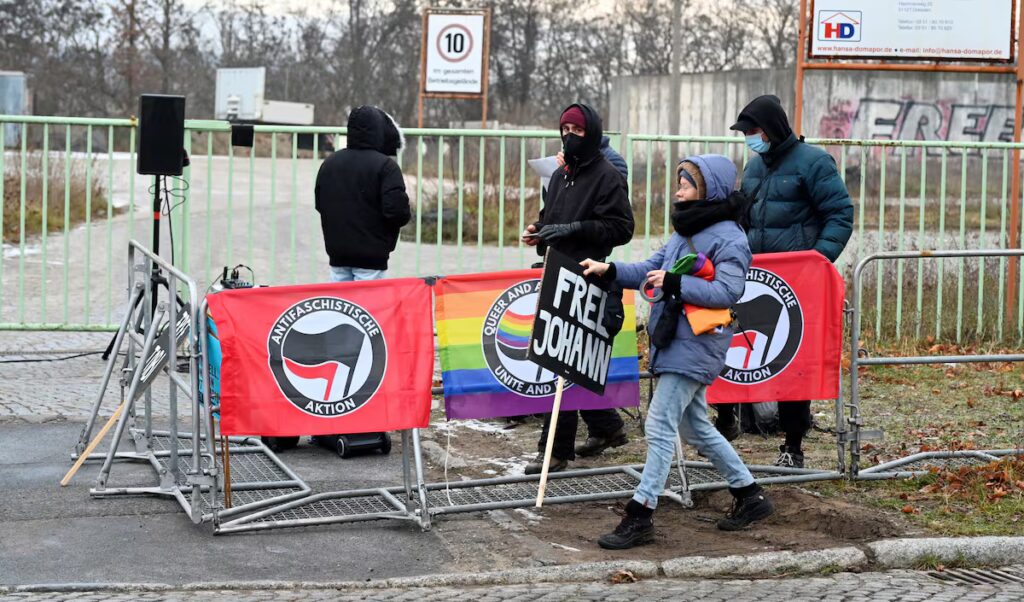
The trial of seven alleged left-wing extremists began on Tuesday at the Higher Regional Court in Dresden, eastern Germany, under tight security and amid protests from around two dozen supporters. They are accused of having carried out violent attacks against alleged far-right exponents for several years. According to the German Federal Prosecutor’s Office, six of the seven defendants, aged between 28 and 49, belonged to a criminal organization known as Hammerbande (Hammer Gang) or Antifa Ost (Antifa East), founded, according to the indictment, in late 2017 or early 2018 in and around Leipzig, in the east of the country. The seventh is accused of supporting her.
Membership of a criminal organization and serious bodily harm are punishable by up to five and ten years’ imprisonment respectively.
In the indictment, the Prosecutor’s Office attributes “militant anti-fascism” and far-left attitudes to the six men and one woman, as well as planning attacks on members of the far-right environment with the aim of sending a signal to discourage right-wing extremists. They will also have to answer for serious bodily injury, attempted murder and material damage. According to the Prosecutor’s Office, the attacks were carried out by various groups, both in Germany and abroad.
The attackers acted “in a planned and organized manner,” chief prosecutor Alexandra Geilhorn said while reading the 270-page indictment, according to public broadcaster MDR. In some cases the defendants assumed that the victims might die, added the representative of the Prosecutor’s Office.
The focus is above all on the defendant Johann G., who is attributed a leadership position in the group. He is accused of planning the attacks and recruiting accomplices. Together with co-defendant Paul M. he also organized combat training for the members. In some warehouses the group stored, among other things, hitting tools, pepper spray, masking tools and cell phones. Johann G. was wanted for years until he was finally arrested on a train in Thuringia a year ago.
The arrests took place as part of the “Antifa Ost trial”, as the entire investigation into this series of far-left attacks in Saxony, Thuringia and Saxony-Anhalt is known. In reality the case, which will last until the summer of 2027, is actually the continuation of the trial against the student Lina E., sentenced in the same court, in 2023, to five years and three months in prison, and who was the romantic partner of the main defendant. Three other co-defendants received lesser sentences. A key witness incriminated them. Both they and the defendants now belonged to the same group led by Lina E. and Johann G.
According to the Prosecutor’s Office, the group committed a total of 14 attacks in Germany and abroad – in places such as Wurzen, Leipzig, Dessau-Rosslau, Dortmund, Erfurt and Budapest – in which 35 people were injured, some of them seriously. In the Hungarian capital, in February 2023, the last attacks took place against right-wing extremists who had participated in the neo-Nazi demonstration on the Day of Honor. The investigation into what happened there was included under the name of The Budapest case.
The American government recently classified the group Antifa Ost as a terrorist organization, which surprised the German authorities since, as reported by a spokesperson for the German Ministry of the Interior, “the potential danger posed by the group has already been significantly reduced in recent times” and “the gang leaders and the most violent members of the group have already been convicted and are in prison or in police custody”. The Federal Office for the Protection of the Constitution, as the intelligence service is known in Germany, describes the association as a “violent network” of individuals, not an organization with a fixed hierarchy, and believes the network is “clearly weakened” due to prosecutions, sentences and arrests.





